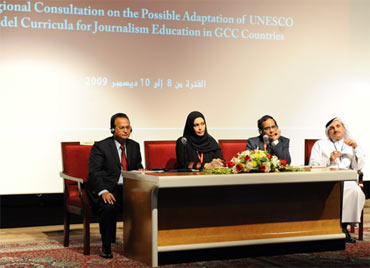Consultation in Bahrain commits Arab countries to improving journalism education
17-12-2009 (Paris)

Abdul Waheed Khan UNESCO’s
Assistant Director-General for
Communication and Information
© University of Bahrain
A Regional Consultation on the Adaptation of UNESCO’s Model Curricula for Journalism Education in Gulf Cooperation Council (GCC) Countries took place from 8 to 10 December in Bahrain. It resulted in a set of recommendations committing GCC countries to improve the quality of journalism education in the region.
Hosted by the University of Bahrain, under the patronage and in the presence of His Excellency Dr Majid Bin Ali Alnoaimi, the Education Minister of the Kingdom of Bahrain, the Consultation was attended by 35 leading representatives from GCC institutions in the field of journalism, including academia, industry and regulatory agencies for higher education. They analysed the UNESCO Model Curricula with the view of its possible adaptation to GCC journalism schools.
Addressing the gathering, UNESCO’s Assistant Director-General for Communication and Information, Abdul Waheed Khan, made it clear that UNESCO’s Model Curriculum is not prescriptive but is a generic model that can be adapted according to each country’s specific needs. It takes into account social, economic, political and cultural contexts of a country, highlighting the connection between democracy and journalism, and arguing for a more cross-disciplinary approach within journalism training organizations.
The Curricula offer a comparative framework for full or partial adaptation, depending on institutional responses.
In his address, the President of the University of Bahrain, Ibrahim Janahi, expressed the hope that the Consultation would come up with results and recommendations that would contribute to professional media development in GCC States.
The Dean of the College of Arts of the University of Bahrain, Haya Al Naimi, declared that this Consultation is an important step towards quality journalism education.
Among other things, the Consultation endorsed the Declaration of Principles of Journalism Education developed at the first World Journalism Education Congress (Singapore, 2007), and renewed the commitment of GCC countries to improve the quality of journalism education in the region and to consider the possibility of adapting, or partially adapting, UNESCO’s Model Curricula. The Consultation resulted in a set of recommendations and the establishment of an association of GCC mass media educators.
Addressing the gathering, UNESCO’s Assistant Director-General for Communication and Information, Abdul Waheed Khan, made it clear that UNESCO’s Model Curriculum is not prescriptive but is a generic model that can be adapted according to each country’s specific needs. It takes into account social, economic, political and cultural contexts of a country, highlighting the connection between democracy and journalism, and arguing for a more cross-disciplinary approach within journalism training organizations.
The Curricula offer a comparative framework for full or partial adaptation, depending on institutional responses.
In his address, the President of the University of Bahrain, Ibrahim Janahi, expressed the hope that the Consultation would come up with results and recommendations that would contribute to professional media development in GCC States.
The Dean of the College of Arts of the University of Bahrain, Haya Al Naimi, declared that this Consultation is an important step towards quality journalism education.
Among other things, the Consultation endorsed the Declaration of Principles of Journalism Education developed at the first World Journalism Education Congress (Singapore, 2007), and renewed the commitment of GCC countries to improve the quality of journalism education in the region and to consider the possibility of adapting, or partially adapting, UNESCO’s Model Curricula. The Consultation resulted in a set of recommendations and the establishment of an association of GCC mass media educators.
 Discussions during the Consultation
Discussions during the Consultation© University of Bahrain
 UNESCO and Bahrain representatives on the podium
UNESCO and Bahrain representatives on the podium© University of Bahrain
Related themes/countries
· Arab States
· Bahrain
· Training of Media Professionals
Share this story:
Contact information
- UNESCO
Source














